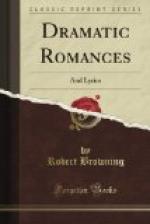15. I left his arm that night myself: George W. Cooke points out that in his Living Authors of England Thomas Powell describes this incident, the “young author” mentioned being himself: “We have a vivid recollection of the last time we saw him. It was at an evening party, a few days before he sailed from England; his intimate friend, Mr. Browning, was also present. It happened that the latter was introduced that evening for the first time to a young author who had just then appeared in the literary world. This, consequently, prevented the two friends from conversation, and they parted from each other without the slightest idea on Mr. Browning’s part that he was seeing his old friend Domett for the last time. Some days after, when he found that Domett had sailed, he expressed in strong terms to the writer of this sketch the self-reproach he felt at having preferred the conversation of a stranger to that of his old associate.”
54. Monstr’-inform’-ingens-horrend-ous: a slight transposition of part of a line in Virgil describing Polyphemus, “Monstrum horrendum informe ingens,” a monster horrid, misshapen, huge.
55. Demoniaco-seraphic: these two lines form a compound of adjectives humorously used by Browning to express the inferiority of the writers he praised to Waring.
99. Ichabod: “Ichabod, the glory is departed.” I Samuel IV. 21.
112. syenite: Egyptian granite
122. Lamb-white maiden: Iphigenia, who was borne away to Taurus by Diana, when her father, Agamemnon, was about to sacrifice her to obtain favorable winds for his expedition to Troy.
152. Caldara Polidore: Surnamed da Caravaggio. He was born in Milan in 1492, went to Rome and was employed by Raphael to paint the friezes in the Vatican. He was murdered by a servant in Messina, 1543.
155. Purcell: an eminent English musician, composer of church music, operas, songs, and instrumental music. (1658-1695).—Rosy Bowers: One of Purcell’s most celebrated songs. “‘From Rosie Bowers’ is said to have been set in his last sickness, at which time he seems to have realized the poetical fable of the Swan and to have sung more sweetly as he approached nearer his dissolution, for it seems to us as if no one of his productions was so elevated, so pleasing, so expressive, and throughout so perfect as this” (Rees’s Cyclopaedia, 1819).




